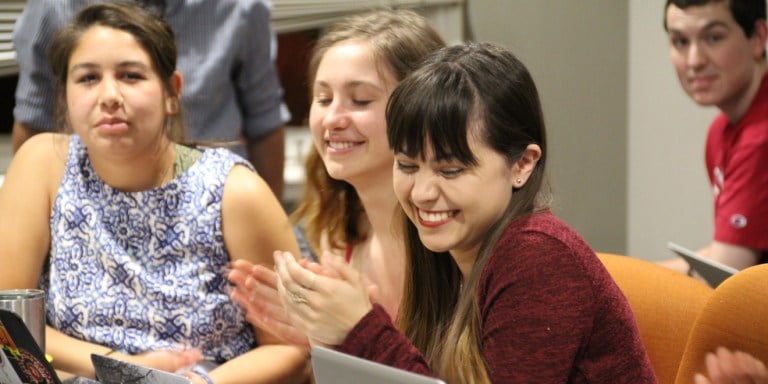
In its 28th and final meeting Tuesday night, the 18th Undergraduate Senate — facing a funding squeeze — unanimously passed a bill to transfer $100,000 from its Programming Board Reserves to the Programming Board’s Spring 2017 budget. Absent from Tuesday’s proceedings were bills to impeach two Constitutional Council members, which have been dropped.
Funding
With no funds left in the budgeted Programming Board as of the fourth week of spring quarter, Senator Cenobio Hernandez ’18 and Senate Chair Shanta Katipamula ’19 respectively authored and co-sponsored a “Bill to Approve Reserve Transfer to Programming Board and Class Presidents.”
Hernandez told The Daily that funds for this quarter ran out early because the Senate had to fund Full Moon on the Quad (FMOTQ) and Mausoleum.
The transfer makes possible the financial requests of various Volunteer Student Organizations (VSOs), which the bill speculates will average at least $12,000 per week for the remaining six weeks of the quarter. According to Hernandez, though, most student groups over-budget, so he thinks the reserves will grow.
The bill also transferred funds to the Classes of 2019 and 2020, as their recently-elected presidents seek to fund next year’s FMOTQ and Mausoleum party, respectively. The funds put a cap on the Senate’s contributions to these two activities.
”The Undergraduate Senate cannot sustainably fund the full cost of these events, and having the Senate provide a limit early on for these events enables the Class Presidents to seek other sources of funding and plan their event accordingly,” the bill states.
Impeachment dropped
Meanwhile, Senate Chair Shanta Katipamula ’19 has dropped bills to impeach two Constitutional Council members, Brian Baran J.D. ’18 and Jonathan York J.D. ’18.
Katipamula and other senators originally pushed for the bills on account of the council members’ conduct during the Council’s March 8 hearing for LSJUMB/KZSU v. Undergraduate Senate; some members of the Senate deemed the Council members’ behavior “obnoxious” and “dishonest.” Other senators did not think that the allegations merited impeachment, with the result that the impeachment bills were tabled at last week’s Senate meeting.
For some attendees at last week’s meeting, the bills to impeach also raised questions regarding separation of powers between the Constitutional Council and the Senate. In a previous statement to The Daily, York and Baran voiced suspicion that the Senate would not have pursued impeachment if it had not lost the recent Council hearing.
The decision to drop the impeachment bills follows a special Monday meeting between all branches of the ASSU to discuss improvements to the Constitutional Council process as a whole.
“Both parties, I think, were relatively pleased with the outcome of the meeting,” Katipamula said, referring to the Senate and the Council. “As a show of good faith, with the intention that all of these action items that we outline would get worked on in good fashion, I decided to drop the bills.”
York presented a different explanation, saying the bills lacked sufficient support.
“It became clear last week that many senators were uneasy with the idea of impeaching an independent judiciary,” York wrote in a statement to The Daily. “Dropping these bills was a necessary step toward preserving the integrity of the ASSU.”
However, both Baran and York emphasized that they look forward to working together with the ASSU on improvements discussed Monday.
“I applaud the Senate’s decision to move beyond this issue in favor of working with us to make the process better,” Baran wrote to The Daily Tuesday.
Katipamula was especially pleased that the Constitutional Council, senators, Graduate Student Council members and the new and old ASSU executives all attended Monday’s meeting.
“I don’t think there are enough situations where [members from all branches] come together in one room to talk about points like this,” she said. “There are a lot of things in the joint bylaws that need to be updated, as we discussed tonight. Hopefully, this is something that the next Senate works on.”
Katipamula intended to discuss the dropping of the bills during the Senate meeting’s Open Forum period, but an influx of senators’ final comments prior to the swearing-in ceremony for the 19th Senate prompted the Open Forum to conclude.
ASSU Spring election
Despite allegations that the recently-elected “Gradu18” senior class president slate violated campaign rules, the Undergraduate Senate certified election results. York swore in recently-elected ASSU Executives President Justice Tention ’18 and Vice President Vicki Niu ’18.
The Executives, in turn, swore in the newest members of the ASSU Senate: Kojoh Atta ’20, Kimiko Hirota ’20, Lark Wang ’20, Erica Scott ’20, Dory Rodriguez ’20, Hamzeh Daoud ’20, Janique Lee ’20, Remy Gordon ’20, Cole McFaul ’20, Ana Carolina Queiroz ’20, Aamnah Khalid ’20, Chapman Caddell ’20 and Katie Hufker ’18. Gabe Rosen ’19 and Matthew Cohen ’18 are returning senators.
An investigation regarding alleged campaign violations by “Gradu18” continues. The slate has denied breaking the rules.
Other Updates
Senator Carson Smith ’19 provided an update regarding the University’s Renaming Committee, created last March to formulate protocols for possibly renaming buildings on campus. She noted that President Marc Tessier-Lavigne has renewed the membership of students on the committee and added that the group hopes to have a format for such protocols by the end of the school year.
Smith was unable to provide specific examples of cases the committee might review in the future. However, much controversy has arisen around Stanford dorms and academic halls named after Stanford’s first president, David Starr Jordan, who was a prominent eugenicist, and Father Junipero Serra, whose legacy has drawn criticism for its overtones of paternalism and for mistreatment of Native Americans in California.
Contact Courtney Douglas at ccd4 ‘at’ stanford.edu.
This post has been updated with additional comments from Hernandez on the Programming Board’s funding shortfall.
